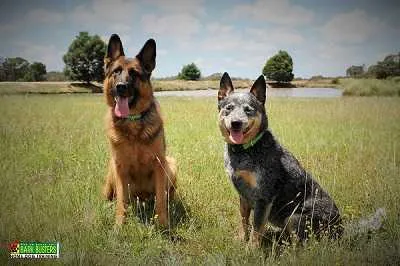Tips For Keeping Your Dog Healthy For Life

Are you doing everything possible to keep your dog healthy and happy? Spending time with your dog and providing a healthy lifestyle are key to your dog's longevity.
Here are some great tips from Bark Busters to ensure your dog stays in tip top shape:
- Exercise. Your dog needs daily exercise both physically and mentally. A tired dog is a well-behaved dog. Depending on the breed, a 15-minute walk may tire some dogs, while others may need a 4km romp. If you're not home during the day, make sure to leave them with chew toys or something that engages their brain like the GameChanger®.
- Diet. Feed your dog high-quality well-balanced dog food. Although there will always be a debate about kibble versus a raw diet, it's important that your dog's diet includes mainly meat and vegetables. Avoid common filler ingredients in dog food that may actually harm your dog's health like Ethoxyquin, Propylene Glycol, BHT/BHA, Corn Syrup and corn, and animal by-products. Know that feeding your dog certain types of human food can hurt or even kill your dog. Avoid foods like chocolate, raisins, yeast dough, any foods with xylitol, caffeine, avocados and other foods that your dog cannot metabolise. Remember that as your dog ages, their dietary needs may change.
- Vet visit. One of the most important people in your dog's life next to yourself will be their vet. Schedule a wellness appointment at least once a year or twice a year for senior dogs. Preventative care is very important to the quality and quantity of a dog's life. The exam should include a complete blood count, a blood-chemistry panel, a thorough dental check, and a vaccination review to ensure that your dog is up-to-date with their shots.
- Weight. More than 50% of the dogs are overweight or obese. Talk to your vet about your dog's ideal body weight. A dog is considered overweight if they weigh 10-20% more than the average. Being obese can shorten a dog's life span by 2 years. Plus, obese dogs are more prone to cancer, diabetes, heart disease and more. As far as treats, feed your dog low calorie treats like carrots, green beans, cucumber slices, and apple slices to name a few.
- Hydration. Dogs need plenty of fresh water for their digestion. Don't let them drink out of the toilet ... it's best to keep the lid down! Because bacteria can grow in their water bowl, wash it out daily with soap. Check how much water your dog drinks each day because a big increase or decrease could mean a health problem that may require a visit to the vet. If you're out and about, always carry water with you.
- Grooming. Many people take their dogs to groomers regularly to have their fur brushed, their coats trimmed and washed, and their nails or claws trimmed. Just like with humans, plaque and bacteria can build up on your dog's teeth, so they need to be brushed regularly and checked for sores or loose or damaged teeth. Brushing promotes good dental hygiene and helps your dog avoid problems such as tartar, gum disease, tooth loss, infection, and bad breath.
- Play. Dogs are not meant to be solitary creatures. Like people, they need companionship to thrive. Spend some time every day playing fetch, hide and seek or Frisbee. If your schedule permits and the temperatures outside are not too extreme, take your dog with you in the car. Your dog needs one-on-one attention to feel happy and secure.
- Body check. Make sure to check your dog's face, legs, tail, and other parts you don't normally pet for any lumps or signs of redness in the skin. Also check for fleas, ticks and mites.
- Shelter. Many dog owners have indoor dogs, providing them with a comfy bed or crate in which to sleep. If your dog is an outdoor dog, make sure they have a place to go should the weather the turn inclement. It is your responsibility to provide shelter that protects your dog from heat, cold, rain, and wind.
- Dog Training. Remember that dogs want to please you - they just don't know how. Dogs thrive with firm leadership and routine. Training lets you set expectations so your dog is less stressed. It is also safer if a dog knows basic obedience like "come", "sit" and "stay. These commands could save their life. Bark Busters is happy to help with this one!
- Purpose. As pack members, dogs need a task to perform, a reason for being. They don't like to hang around the house all day doing nothing unless they are sick. Bored dogs usually get into trouble by chewing, digging or engaging in nuisance barking. Many dogs will find walking on a leash as their job or providing you with companionship. Dogs can even be taught to bring you the paper or perform tricks.
- Vaccinations. It is extremely important to follow the recommended regimen of vaccinations to prevent your dog from acquiring a number of serious illnesses.
Recent Articles
- Keep Your Dog Safe This Summer: Bark Busters’ Essential Tips
- Christmas Dog Safety Tips: Keep Your Dog Safe & Happy This Festive Season
- Leash Training - How to Stop your Dog from Pulling on Walks
- Dog Aggression Training & Tips
- Halloween Safety Tips for Dog Owners
- Understanding and Training Dogs with Separation Anxiety
- Why Is My Dog Barking So Much? Understanding Excessive Barking and How To Help
- Dogs need education too!
- Winter woes? A dog-lover's guide to solving winter blues
- The Truth About Those Dog Myths
